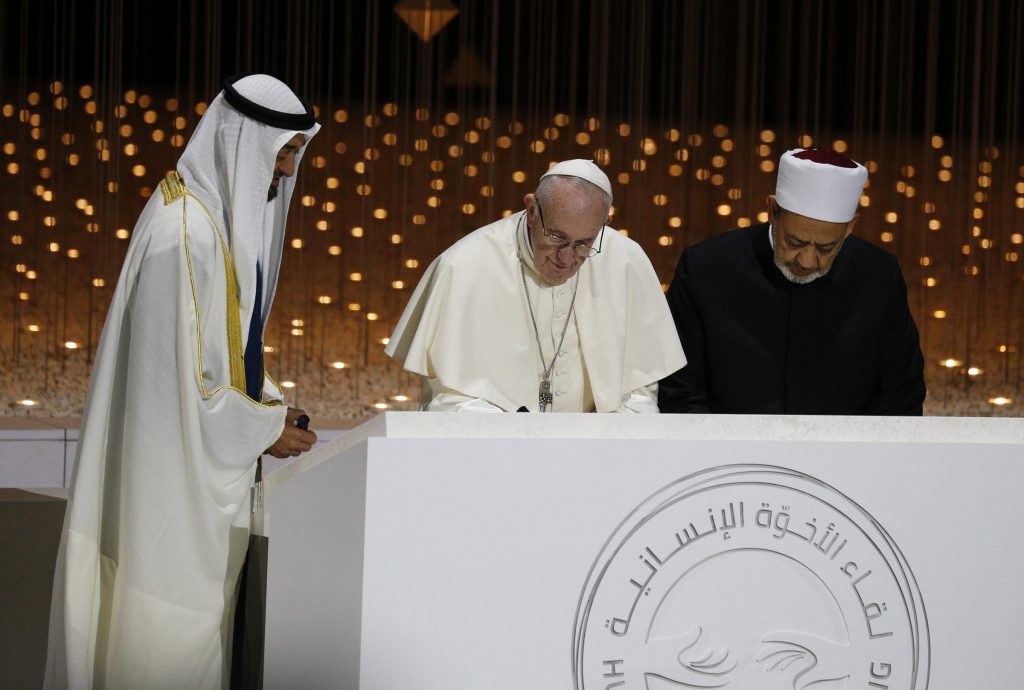ROME — After more than 2,000 years of history, one rarely gets to use the word “unprecedented” when talking about the Vatican and the papacy. Yet after the first papal trip to the Arabian Peninsula Feb. 3-5, Pope Francis was not only at the center of such an event but its protagonist.
Arguably one of the least taxing trips of his pontificate, with only two speeches, a six-hour flight and a three-hour time difference, Francis’ visit to the United Arab Emirates was one of those in which the medium was the message.
While in the UAE, the pontiff encountered professor Ahmed a-Tayyeb, the grand imam of Al-Azhar University in Cairo and a key Islamic theologian. On Monday, the two signed a joint declaration titled “Human fraternity for world peace and living together.”
While plenty of documents on interreligious dialogue have been signed before, never have they come at the conclusion of a two-day interreligious dialogue gathering held in a Muslim majority country that happens to be one of Saudi Arabia’s main allies.
“We call upon all concerned to stop using religion to incite hatred, violence, extremism, and blind fanaticism, and to refrain from using the name of God to justify acts of murder, exile, terrorism, and oppression,” reads the document. According to the grand imam, it will be taught in Al Azhar and in every school in Egypt.
“We ask this on the basis of our common belief in God who did not create men and women to be killed or to fight one another, nor to be tortured or humiliated in their lives and circumstances,” the declaration reads. “God, the Almighty, has no need to be defended by anyone and does not want his name to be used to terrorize people.”
Before they signed the document, both Francis and a-Tayyeb delivered speeches calling for true religious freedom. The grand imam denounced Islamophobia in the West, but also called upon the countries in the Middle East, where Muslims are a clear majority, not to treat Christians as “second-class” citizens.
Surrounded by imams, rabbis, Buddhist monks and Hindu leaders, the pope distinguished real religious freedom from mere freedom of worship, saying that “without freedom, we are no longer children [of God] but slaves.”
One cannot proclaim fraternity and then act in the opposite way, Francis said.
The pope also denounced the building of walls and urged what he called the “demilitarization of the human heart,” in a country that a month ago was bombing Yemen as part of a coalition led by Saudi Arabia.
The “miserable crudeness” of war, Francis denounced, is visible, including in Yemen, Syria, Iraq, and Libya.
“There’s no alternative: We will either build the future together or there will be no future,” Francis said. “Religions, in particular, cannot renounce the urgent task of building bridges between peoples and cultures.”
Francis also said that he looks forward to “concrete opportunities for encounter,” not only in the UAE but the entire region, which he called a “focal point of the Middle East.”
“I look forward to societies where people of different beliefs have the same right of citizenship and where only in the case of violence in any of its forms is that right removed,” he said.
An estimated 9 percent of UAE’s total population is Catholic, representing some 900,000 people. Most, if not all, are immigrants, including roughly 60 priests who serve in a handful of churches.
Though UAE is often praised as a country tolerant of faiths other than Islam, full religious freedom is far from being a reality. This was particularly felt on Tuesday, when Francis led the first Mass held in a public space in the UAE in Abu Dhabi’s Zayeb Sports City, which attracted more than 130,000 people.
Before the pope’s arrival, people were enthusiastically sharing their faith, something most of them have not been able to do in public since they moved to the UAE to work in the oiling industry, construction, or cleaning homes.
In his homily Francis left politics aside, instead becoming the parish priest of the thousands gathered from 100 different countries, thanking them for their witness and urging them to live simply in accordance to the beatitudes. It was a countercultural request in many places, but even further so in a country where luxury and excess are considered almost national virtues.
After Mass the pontiff headed back to Rome, during which he held his customary in-flight press conferences. Francis acknowledged the problem of Catholic nuns being sexually abused by priests and bishops, saying the Church needs to do more to address it. He also said that the killing of those who refuse to convert to Islam, including Christians, is unfortunately “our daily bread.”
“Mistreatment of women is a problem,” he said. “I would say that humanity still hasn’t matured. Women are treated as second class. It’s a cultural problem … in some countries the mistreatment of women goes as far as femicide.”
In the end, many of those who took part in Francis’ brief excursion in the heart of the Muslim world felt it had the potential to be a game changer.
As a Buddhist monk put it, the event has to become “more than a sign” and he, at least, saw the case for saying that participants are committed to precisely that aim.
Inés San Martín is an Argentinian journalist and Rome Bureau Chief for Crux. She is a frequent contributor to the print edition of Angelus and, through an exclusive content-sharing arrangement with Crux, provides news and analysis to Angelus News.
SPECIAL OFFER! 44 issues of Angelus for just $9.95! Get the finest in Catholic journalism with first-rate analysis of the events and trends shaping the Church and the world, plus the practical advice from the world’s best spiritual writers on prayer and Catholic living, along with great features about Catholic life in Los Angeles. Subscribe now!

